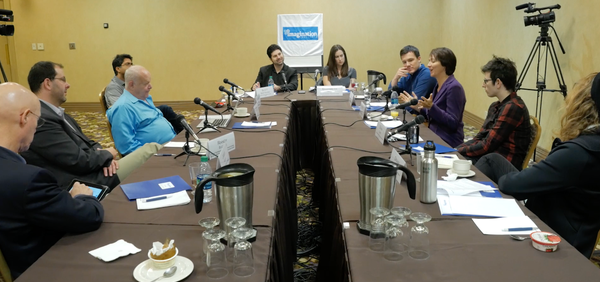This article was published in Scientific American’s former blog network and reflects the views of the author, not necessarily those of Scientific American
The past decade has seen an explosion of research into the psychology and neuroscience of imagination, with rapidly evolving literatures on topics ranging from mind-wandering, daydreaming, mental simulation, theory of mind, and creative problem solving. Despite considerable progress, however, several fundamental questions remain: What is imagination, and how do we measure it? Is imagination a fixed ability, or can it be enhanced through targeted intervention?
These questions inspired a recent gathering of leading experts on the neuroscience of imagination in Philadelphia for an “Imagination Retreat,” featuring neuroscientists Jessica Andrews-Hanna, Roger Beaty, Randy Buckner, Kalina Christoff, Chandra Sripada, and Diana Tamir. The meeting was organized by Scott Barry Kaufman, Martin Seligman, and Elizabeth Hyde from the Imagination Institute, and was funded by a grant from the John Templeton Foundation, and it consisted of a series of discussions that took place over the course of a three-day period.
This report highlights some of the common themes from the retreat, with a focus on the brain network that is thought to give rise to imagination: the so-called "default network". The retreat began by discussing the history of the default network and its serendipitous discovery in the late 1990s by Marcus Raichle and other neuroscientists, including one of the Imagination retreat participants, Randy Buckner. Participants explored the various cognitive functions that have since been ascribed to the default network—from mind-wandering to mental simulation to creative cognition—and their experiences as scientists who study these complex mental phenomena. The retreat discussions also focused on the measurement and cultivation of imagination, which touched on practical applications in educational contexts. The report concludes with a central theme that emerged from the retreat: the need for a new field of imagination science.
On supporting science journalism
If you're enjoying this article, consider supporting our award-winning journalism by subscribing. By purchasing a subscription you are helping to ensure the future of impactful stories about the discoveries and ideas shaping our world today.
Read the full report, prepared by Roger Beaty, here.
Here are video highlights of the event:
Retreat Participants:
Jessica Andrews-Hanna, Assistant Professor in the Department of Psychology and the Cognitive, Science Program at the University of Arizona
Drake Baer, Senior writer at Thrive Global
Roger Beaty, Postdoctoral Fellow in the Department of Psychology at Harvard University
Randy Buckner, Professor of Psychology and Neuroscience at Harvard University
Kalina Christoff, Professor in the Psychology Department and the Brain Research Centre at the University of British Columbia
Elizabeth Hyde, Research Specialist, Imagination Institute, University of Pennsylvania
Scott Barry Kaufman, Scientific Director, Imagination Institute, University of Pennsylvania
Martin Seligman, Director, Positive Psychology Center and the Zellerbach Family Professor of Psychology at the University of Pennsylvania
Chandra Sripada, Associate Professor in Psychiatry and Philosophy at the University of Michigan
Diana Tamir, Assistant Professor of Psychology at Princeton University
